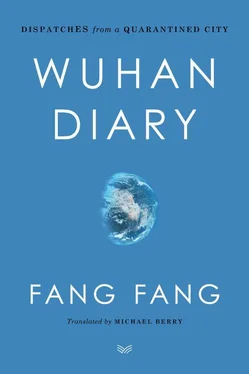It is a good thing, then, that a few days ago a magazine called The Poet Art & Literature Review (apologies for my ignorance, but I never read this magazine before) emailed me with a few questions. Since they are an arts magazine and not a news organization, the questions they sent over were pretty open-ended. Since we are all in the same field, I decided to answer their questions somewhat freely. Today I’ll share the interview with you below:
Your diary is so true to life; you record all kinds of little details about the everyday, even those emotional things that make you sigh. Did you ever consider revising it with a more polished literary language?
Fang Fang:It is only if you have a different view of what literature is that you would think that. This is a diary; so there is no need for further revision. When I first started writing this diary, I would post each entry on Weibo, which is an informal platform where you can basically speak your mind. Moreover, I’m not just some idealistic artistic youth, I’m a professional writer. I write from the heart and try to truthfully capture what is in my heart; for me, that is enough.
There are a lot of people saying they would rather read Fang Fang’s diary than read reports from official media outlets like Yangtze Daily . What do you make of that? Did you ever imagine that your Wuhan Diary would elicit such a huge response?
Fang Fang:I think those who say they don’t trust the media are being a bit overly biased. In order to understand the general trajectory of how the coronavirus is spreading, you still should be reading what the mainstream media has to say. All I present in my diary are my own personal thoughts and feelings. You can’t get a complete perspective from just reading my diary; that should be obvious. When I first started writing I never imagined that so many people would be reading it, which was very strange to me. I even asked my colleagues and classmates why they think that so many people have been following my online diary posts; but they didn’t have a good answer, either.
There is a line from your diary that reads: “One speck of dust from an era may not seem like much, but when it falls on your head it is like a mountain crashing down on you.” Those words have become the single most widely circulated sentence of this entire coronavirus outbreak; somehow that sentence has been seen as emblematic of everything we have experienced. Looking back, do you feel that those words have transformed into a kind of prophecy?
Fang Fang:That sentence isn’t prophetic, it is reality—a reality that is with us during every era.
Every day you seem to spend a lot of time following news stories about individual people. Besides your Wuhan Diary , do you have any plans to record the fate of some of these individuals during this outbreak, perhaps as a novel? Or are there any individual stories that have had a particularly powerful impact on you?
Fang Fang:There are a lot of people whose stories have moved me, but I don’t have any plans to write a novel about what has happened here. I already have too many writing projects that I’m doing right now.
Some people have accused the majority of Chinese writers of being mute throughout this coronavirus outbreak; what drove you to speak out? Especially considering how frequently your diary places blame on government officials and raises criticisms…
Fang Fang:I don’t really agree with that. There are actually quite a few local writers who have all been documenting what has been happening. What’s more, the method with which people record things is very different; some people are writing novels, others are recording things privately, and there are actually quite a few people publishing accounts on public platforms like I am. As for Chinese writers outside of Wuhan, since they don’t understand the local dynamics it is hard for them to know how to even approach this subject. When the Ebola outbreak took place in Africa, I never published anything about it because I didn’t have any firsthand knowledge and wasn’t that clear about many of the details. This is perfectly natural. I think it is unreasonable to expect every writer to speak out on this issue. For the outbreak in Wuhan to spread like it has is the result of multiple forces. Government officials and specialists from Hubei and Wuhan, including members of the Wuhan Health Commission, all have a responsibility for what happened here; a very large responsibility at that. Since they are among the responsible parties, why shouldn’t I speak out?
“If you are just going to fawn all over the officials, please restrain yourselves. I might be old, but I will never tire when it comes to speaking out.” This line reminds me of a lot of things that have happened to you, such as those open letters you published criticizing some things that happened with the Lu Xun Literary Award or a certain poet’s assessment for promotion. These criticisms were all directed at people in your field whom I’m sure you will encounter in the future; yet you still insisted on speaking out. What is the meaning of criticism for you?
Fang Fang:When I was serving as the chair of the Hubei Writers Association, there would sometimes be things I saw that were against our regulations. Whenever I encountered these situations, I would discuss them with the Chinese Communist Party representatives in the Writers Association and ask them to step in. In situations where they failed to take action, I felt it incumbent on me to speak out online about what was happening. I feel like I was just doing my job. Now that I’m retired, they are all completely rotten, but it is none of my business anymore.
Do you agree with the idea that writers should shoulder more social responsibility besides just writing?
Fang Fang:That depends on the individual. Not everyone’s personality is suited to take up that additional social responsibility. It is easy to “shoulder it” but if you don’t have the courage, insight, and ability it can be a tall task, especially if you have a weak personality, tend to be timid, or get anxious easily. If you fall into that latter category, then there is no reason to take on that responsibility. In this world there are people who just bear it and others who enjoy taking up that responsibility; that’s how it has always been. But you can’t force people to do these things; it comes down to a matter of individual choice. There is no such thing as what people “should” or “shouldn’t” do.
Back when Soft Burial was published, it elicited attacks from all sides; how did you look at those attacks? And were you ever scared when there were so many agitated voices of criticism attacking you?
Fang Fang:I never let it get to me. What’s there to be scared of? I suppose they are the ones who are scared of me? As for written polemics, as a professional writer, I live by the pen. So what is there to fear? Of course if they showed up at my front door with clubs in their hands, that would be another matter. But all they do is write essays, and that is what I do for a living. Some of those critics you are referring to must be those ultra-leftists? They operate at a very low level; their writing skills, ability to make logical judgments, and critical thinking skills are all quite pathetic. It would be an utter waste of time for me to even respond to their essays. It would be a waste to use the beautiful Chinese language on them. So I prefer not to get into arguments with them. But government officials are a different story, especially high-ranking officials. They wield a lot of power; even after they have retired they can still have a profound influence on a lot of people. So when they attack me I think it is important to fight back. But I’m too lazy to pay much attention to most of those ultra-leftist hooligans; but when they are wearing an official government hat, why shouldn’t I push back? When I fight back I’m not the one who ends up losing, it’s them. They have now learned their lesson and know not to go after writers like me. Let’s see if any more of those retired high-ranking officials dare to come after any more writers. If they do, they will only be making themselves look bad.
Читать дальше



![О Генри - Закупщик из Кактус-Сити [The Buyer from Cactus City]](/books/405348/o-genri-zakupchik-iz-kaktus-thumb.webp)








